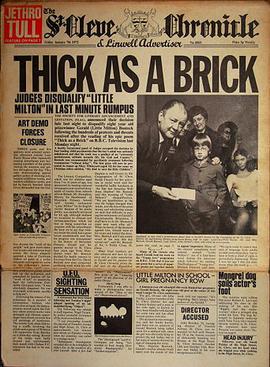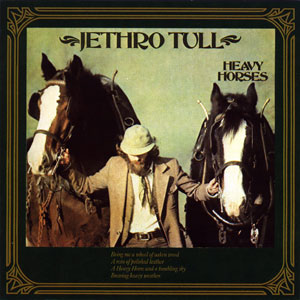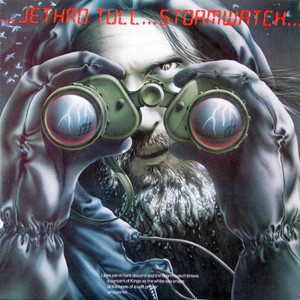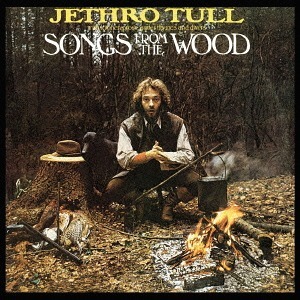
Jethro Tull are a British progressive rock band formed in Blackpool, Lancashire, in 1967. Initially playing blues rock and jazz fusion, the band soon incorporated elements of English folk music, hard rock and classical music, forging a signature progressive rock sound. The group's lead vocalist, bandleader, founder, principal composer and only constant member is Ian Anderson, who also plays flute and acoustic guitar. The group has featured a succession of musicians throughout the decades, including significant contributors such as guitarists Mick Abrahams and Martin Barre ; bassists Glenn Cornick, Jeffrey Hammond, John Glascock, Dave Pegg, Jonathan Noyce and David Goodier; drummers Clive Bunker, Barrie "Barriemore" Barlow and Doane Perry; and keyboardists John Evan, Dee Palmer, Peter-John Vettese, Andrew Giddings and John O'Hara.

Thick as a Brick is the fifth studio album by the British rock band Jethro Tull, released on 3 March 1972. The album contains one continuous piece of music, split over two sides of an LP record, and is intended as a parody of the concept album genre. The original packaging, designed as a 12-page newspaper, claims the album to be a musical adaptation of an epic poem by fictional eight-year-old genius Gerald Bostock, though the lyrics were actually written by the band's frontman, Ian Anderson.

Aqualung is the fourth studio album by the British progressive rock band Jethro Tull, released on 19 March 1971, by Chrysalis Records. It is widely regarded as a concept album featuring a central theme of "the distinction between religion and God", though the band have said there was no intention to make a concept album, and that only a few songs have a unifying theme. Aqualung's success signalled a turning point in the career of the band, which went on to become a major radio and touring act.

Heavy Horses is the eleventh studio album by British progressive rock band Jethro Tull, released on 10 April 1978.

Too Old to Rock 'n' Roll: Too Young to Die! is the ninth studio album released by British band Jethro Tull, recorded in December 1975 and released in 1976. It is the first album to include bassist John Glascock who also contributes with backing vocals. Too Old to Rock 'n' Roll: Too Young to Die! is the last Jethro Tull concept album, which follows the story of Ray Lomas, an aging rocker who finds fame with the changes of musical trends. It was Jethro Tull's only album of the 1970s not to achieve Gold certification.

Roots to Branches is the 19th studio album by the British band Jethro Tull released in September 1995. It carries characteristics of Tull's classic 1970s progressive rock and folk rock roots alongside jazz and Arabic and Indian influences. All songs were written by Ian Anderson and recorded at his home studio. This is the last Tull album to feature Dave Pegg on the bass, and the first to feature keyboardist Andrew Giddings as an official band member, although he had contributed to Catfish Rising (1991) on a sessional basis. As a result, the album notably features the five longest serving members to date in Jethro Tull’s history. It was also the final Tull album to be released through long-time label Chrysalis Records.

Stand Up is the second studio album by British rock band Jethro Tull, released in 1969. It was the first Jethro Tull album to feature guitarist Martin Barre, who would go on to become the band's longtime guitarist until its initial dissolution in 2012. Before recording sessions for the album began, the band's original guitarist Mick Abrahams departed from the band as a result of musical differences with frontman and primary songwriter Ian Anderson; Abrahams wanted to stay with the blues rock sound of their 1968 debut, This Was, while Anderson wished to add other musical influences such as folk rock.

Stormwatch is the twelfth studio album by progressive rock band Jethro Tull, released in September 1979. The album is often considered the last in a trio of folk rock albums released by the band at the end of the 1970s, alongside Songs from the Wood (1977) and Heavy Horses (1978). The album's themes deal mostly with the environment, climate and seaside living, and were heavily inspired by the Isle of Skye in Scotland, where frontman Ian Anderson had recently purchased property.

Benefit is the third studio album by the British rock band Jethro Tull, released in April 1970. It was the first Tull album to include pianist and organist John Evan – though he was not yet considered a permanent member of the group – and the last to include bass guitarist Glenn Cornick, who was fired from the band upon completion of touring for the album. It was recorded at Morgan Studios, the same studio where the band recorded its previous album Stand Up; however, they experimented with more advanced recording techniques.

Songs from the Wood is the tenth studio album by British progressive rock band Jethro Tull, released on 11 February 1977 by Chrysalis Records. The album is considered to be the first of three folk rock albums released by the band at the end of the 1970s, followed by Heavy Horses (1978) and Stormwatch (1979).

Martin Lancelot Barre is an English guitarist best known for his longtime role as lead guitarist of British rock band Jethro Tull, with whom he recorded and toured from 1968 until the band's initial dissolution in 2011. Barre played on all of Jethro Tull's studio albums from their 1969 album Stand Up to their 2003 album The Jethro Tull Christmas Album. In the early 1990s he began a solo career, and he has recorded several albums as well as touring with his own live band.

Crest of a Knave is the sixteenth studio album by British rock band Jethro Tull, released in 1987. The album was recorded after a three-year hiatus caused by a throat infection of vocalist Ian Anderson, resulting in his changed singing style. Following the unsuccessful electronic rock album Under Wraps, Crest of a Knave had the band returning to a more hard rock sound. The album was their most successful since the 1970s and the band enjoyed a resurgence on radio broadcasts, appearances in MTV specials and the airing of music videos. It was also a critical success, winning the 1989 Grammy Award for Best Hard Rock/Metal Performance Vocal or Instrumental in what was widely viewed as an upset over the favorite, Metallica's ...And Justice for All. The album was supported by "The Not Quite the World, More the Here and There Tour".

"Living in the Past" is a song by British progressive rock group Jethro Tull. It is one of the band's best-known songs, and it is notable for being written in the unusual 5
4 time signature. The use of quintuple meter is quickly noted from the beginning rhythmic bass pattern, though it can also be explained as a distinct 6
8 + 2
4 syncopated rhythm.
Dee Palmer is an English composer, arranger, and keyboardist best known for having been a member of the progressive rock group Jethro Tull from 1976 to 1980.

Live at Madison Square Garden 1978 is a concert video and an album by British rock band Jethro Tull, released in 2009. It was recorded on 9 October 1978 at Madison Square Garden in New York City.

"A Song for Jeffrey" is a song recorded by the English progressive rock band Jethro Tull, released as their second single in the U.K. However, in the U.S., it was the B-side to "Love Story". It is written in honour of Ian Anderson's friend and future Jethro Tull bassist Jeffrey Hammond. Another version of the song was recorded for play on BBC radio.

"The Witch's Promise" is a single by the British rock band Jethro Tull, released in January 1970, on the Chrysalis label. It reached No. 4 in the UK Singles Chart, and was promoted by an appearance on the British chart show Top of the Pops. The B-side was "Teacher", an alternate version of which later appeared on the US release of the album Benefit. In the U.S., the single was released on the Reprise label.
"Heavy Horses" is a song written by Ian Anderson and performed by his band Jethro Tull. The song was released on the 1978 album of the same name. Written as a tribute to horses, the song features folk rock elements that rebelled against the musical trends of the period.

The Zealot Gene is the 22nd studio album by the British rock band Jethro Tull, released on 28 January 2022 by Inside Out Music. Nearly five years in production, it is their first studio album since The Jethro Tull Christmas Album (2003), and their first of all original material since J-Tull Dot Com (1999), marking the longest gap between the band's studio albums.

"Teacher" is a song by the British rock band Jethro Tull, first released as the B-side to the January 1970 single "The Witch's Promise", on the Chrysalis label. Written by the band's frontman Ian Anderson, the song is a comment on the corruption of self-styled gurus who used their followers for their own gain.


















